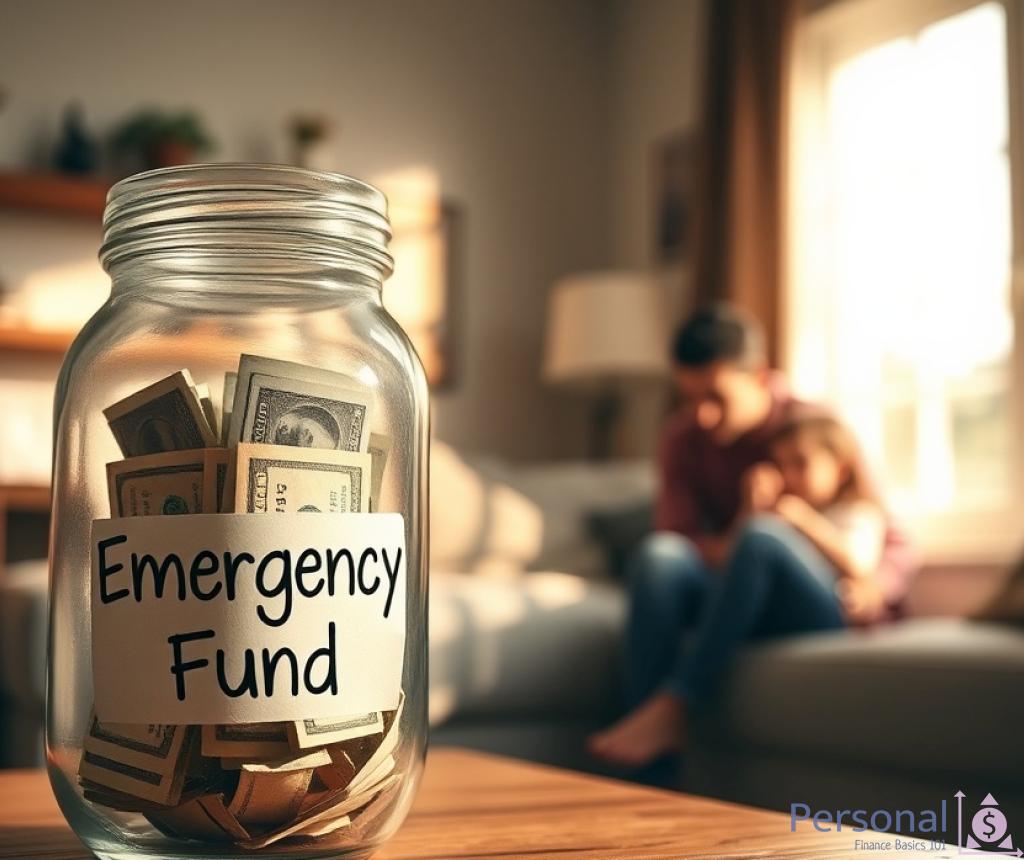Understanding Emergency Funds: A Financial Safety Net

The Importance of an Emergency Fund
In today’s unpredictable financial landscape, having a safety net is more crucial than ever. An emergency fund acts as a buffer against unexpected expenses, providing individuals with the peace of mind that they can handle unforeseen circumstances without derailing their financial stability. With rising living costs and economic uncertainty, understanding the significance of an emergency fund is essential for anyone looking to reduce financial stress.
Benefits Beyond Financial Security
While the primary purpose of an emergency fund is to cover unforeseen expenses, its impact extends far beyond mere financial security. Studies have shown that having a safety net can significantly alleviate stress, anxiety, and other mental health issues related to financial instability. Knowing that you have the resources to manage emergencies can lead to improved mental health outcomes and better overall well-being.
Key Components of a Robust Emergency Fund
Establishing an effective emergency fund involves more than simply setting aside a few dollars. Below is a comprehensive list of considerations that can help you build a robust financial safety net:
- Determine the Right Amount: Aim for three to six months’ worth of living expenses.
- Choose the Right Account: Opt for a high-yield savings account for better returns.
- Automate Savings: Set up automatic transfers to ensure consistent contributions.
- Review and Adjust: Regularly reassess your fund to align with changing financial circumstances.
By understanding these components, individuals can create an emergency fund that not only provides financial stability but also enhances their overall mental health.
The Psychological Impact of Financial Security
The relationship between financial security and mental well-being is intricate and profound. While most people recognize that economic stability contributes to a less stressful life, the specific psychological effects that accompany this security are often overlooked. An emergency fund, serving as a financial cushion, not only safeguards against unexpected costs but also fosters a sense of control and predictability in one’s life, which is invaluable for mental health.
When individuals have the assurance that they can manage unforeseen expenses, such as medical emergencies or sudden job losses, the weight of financial worry begins to lift. This reduction in anxiety is crucial, as prolonged financial stress can lead to serious mental health issues, including depression and chronic anxiety disorders. The mere presence of a well-established emergency fund acts as a psychological balm, providing comfort in knowing that one is prepared for life’s uncertainties.
Transformative Benefits of Preparedness
Financial preparedness has transformative effects that extend beyond immediate fiscal advantages. Studies indicate that individuals who maintain an emergency fund report higher levels of satisfaction with their lives. This satisfaction stems from a robust sense of autonomy and empowerment. In contrast, those who live paycheck to paycheck often find themselves in a cycle of stress and despair, characterized by feelings of helplessness. The stark difference in mental states between these two groups emphasizes the powerful role that financial security plays in shaping psychological resilience.
Creating a Positive Feedback Loop
The act of saving and building an emergency fund can create a positive feedback loop that enhances mental well-being. As individuals contribute to their savings, they experience a sense of achievement and progress. This accomplishment not only boosts self-esteem but also reinforces the habit of saving, further promoting financial literacy and responsibility. In this way, investing in an emergency fund becomes a catalyst for improved mental health, as it fosters a proactive mindset where individuals feel in control of their financial destinies.
In conclusion, the psychological impact of having an emergency fund extends far beyond mere financial security. It cultivates a sense of agency and self-efficacy, which are essential components of mental health. Individuals equipped with the knowledge that they can navigate life’s unpredictabilities are less likely to succumb to stress-related mental health issues, thereby enhancing their overall quality of life.
Building an Emergency Fund: Strategies for Success
Establishing an emergency fund is a proactive step towards achieving financial stability and mental well-being. However, the path to building a substantial emergency fund can often seem daunting. By employing specific strategies, individuals can effectively accumulate savings, providing not only a financial cushion but also ease of mind in times of crisis. Below are actionable strategies designed to facilitate the successful establishment of an emergency fund.
Set Clear Savings Goals
One of the first steps in building an emergency fund is to define clear and realistic savings goals. Understanding your monthly living expenses is crucial, as it informs the total amount you need to save. By determining whether to aim for three, six, or even twelve months’ worth of expenses, you can create a tailored savings plan that aligns with your lifestyle. Setting specific milestones can also help track progress and maintain motivation.
Prioritize Savings in Your Budget
Integrating savings into your monthly budget is essential for successful fund accumulation. Treat your emergency fund contributions like a fixed expense, allocating a certain percentage of your income each month towards it. This prioritization ensures that saving becomes a regular habit rather than an afterthought. Consider the following strategies:
- Automate Transfers: Set up automatic transfers from your checking account to your emergency fund, ensuring consistent contributions without the temptation to spend the money.
- Reduce Non-Essential Expenses: Identify areas in your budget where you can cut back, and redirect those funds towards your emergency savings.
- Utilize Windfalls: Allocate bonuses, tax refunds, or any unexpected income directly into your emergency fund to boost your savings rapidly.
Monitor and Adjust Your Fund Regularly
Building an emergency fund is not a one-time effort; it requires ongoing monitoring and adjustments. Regularly reviewing your financial situation allows you to make necessary changes that reflect your current needs. As your expenses change or your income fluctuates, you should reassess your savings goals and adjust your contributions accordingly. This practice not only reinforces your commitment to saving but also ensures that your emergency fund remains adequate in providing mental and financial security.
In summary, developing an effective emergency fund involves setting clear goals, prioritizing savings, and adapting to changes in your financial landscape. By implementing these strategies, individuals can not only enhance their financial resilience but also cultivate a sense of control and peace of mind, which is invaluable for mental health.
Emergency Funds and Their Role in Stress Mitigation
Understanding Financial Safety and Stress Relief
In an era characterized by economic volatility, the significance of an emergency fund transcends mere financial prudence. This financial reserve not only serves as a safeguard against unforeseen expenses but also plays a pivotal role in alleviating financial stress. The mere knowledge that one has accessible funds can shift an individual’s mindset from a state of anxiety to one of empowerment. As we delve deeper into the relationship between emergency funds and mental health, it’s crucial to recognize how this financial buffer can mitigate stress levels and enhance overall well-being.
The Comfort of Preparedness
Preparedness is a powerful antidote to stress. When individuals are equipped with an emergency fund, they can approach unexpected financial challenges with confidence rather than fear. This sense of readiness not only reduces the likelihood of panic during emergencies but also fosters a proactive approach to financial management. A study conducted by the American Psychological Association revealed that individuals with a financial safety net report lower levels of stress and anxiety compared to those without. The underlying reason is simple: having a financial cushion translates to greater control over one’s life circumstances.
Transformative Psychological Effects
The transformation that occurs when one establishes an emergency fund is profound. As individuals build their savings, they often experience a sense of achievement and growth. This process can lead to a significant increase in self-esteem, as individuals recognize their ability to take charge of their financial futures. Furthermore, the establishment of a financial reserve can break the cycle of stress that often accompanies living paycheck to paycheck. Research indicates that financial stability contributes to improved mental health outcomes, reducing the incidence of anxiety disorders and depression. In essence, emergency funds not only protect against financial turmoil but also cultivate a resilient mindset, empowering individuals to face life’s unpredictabilities with confidence.
Long-Term Mental Health Benefits of Financial Preparedness
Reinforcing a Sense of Stability
Financial preparedness, epitomized by a well-structured emergency fund, instills a sense of stability that can profoundly influence mental health over time. When individuals have the foresight to set aside funds for unexpected expenses, they create a psychological buffer that not only alleviates immediate financial stress but also fosters a long-term perception of security. This perception is crucial; it transforms the way individuals approach their finances and life in general. Instead of viewing financial challenges as insurmountable obstacles, they begin to see them as manageable hurdles.
Moreover, the reassurance that comes with an emergency fund allows individuals to engage more fully in their personal and professional lives. They are less likely to be preoccupied with financial worries, leading to improved focus and productivity. When the mind is free from the shackles of anxiety, creativity and problem-solving abilities flourish, enhancing overall life satisfaction.
Cultivating Resilience Through Preparedness
Over time, the act of maintaining an emergency fund cultivates resilience—a critical trait for navigating life’s inevitable ups and downs. Individuals who consistently save for emergencies develop a proactive mindset, reinforcing their ability to manage stress effectively. This proactive approach is not merely about finances; it permeates every aspect of life. When faced with challenges, such as job loss or medical emergencies, these individuals can respond with a calm assurance, knowing they are equipped to handle the situation.
As they navigate these challenges, they experience personal growth and enhanced self-efficacy. The repeated experience of overcoming financial hurdles without resorting to panic or despair leads to a strengthened belief in their own capabilities. Consequently, this cycle of preparedness and resilience creates a positive feedback loop, where each successful navigation of a financial crisis builds confidence for the future.
Empowerment and Long-Term Well-Being
The mental health benefits of financial preparedness extend far beyond the immediate relief of stress. As individuals increasingly recognize their ability to manage financial uncertainties, they experience a profound sense of empowerment. This empowerment translates into better decision-making, greater life satisfaction, and improved relationships. The knowledge that they have a financial safety net allows them to engage more fully with family, friends, and career opportunities, fostering a deeper sense of community and belonging.
As highlighted in various studies, the long-term mental health benefits of maintaining an emergency fund can lead to a significant reduction in anxiety and depressive symptoms. Individuals become more equipped to cope with change, navigate unexpected life events, and maintain a positive outlook on their financial futures. Ultimately, the establishment of an emergency fund is not just a financial strategy; it is a vital investment in one’s mental health and overall well-being.
Disclaimer
This article has been created or edited with the support of artificial intelligence and is for informational purposes only. The information provided should not be considered investment advice. Please seek the support of a professional advisor before making any investment decisions.






